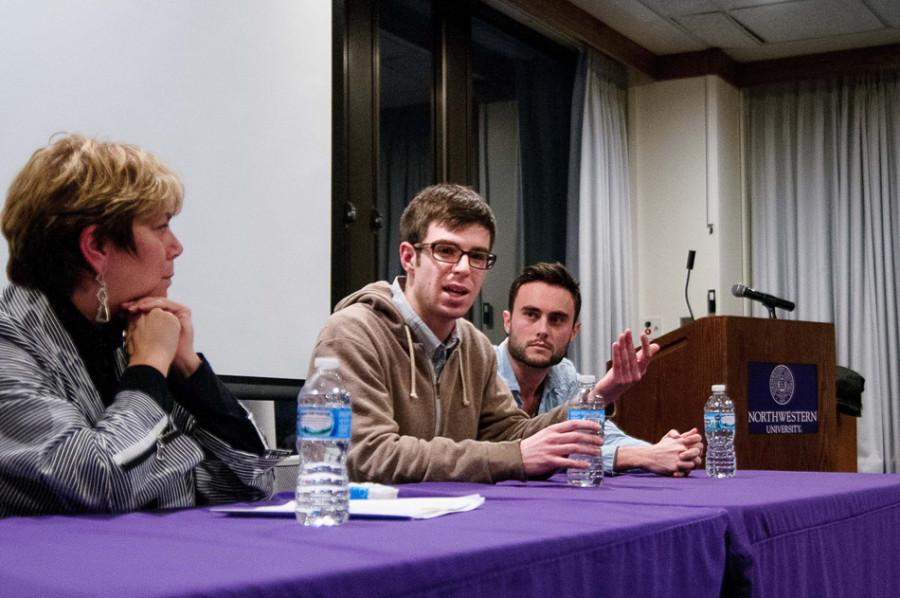Onion writers, former White House official discuss free speech after Charlie Hebdo
Sophie Mann/The Daily Northwestern
Mike Gillis, a writer for The Onion, speaks about freedom of speech at a panel hosted by Northwestern Community Development Corps and Northwestern Political Union. Gillis, Steve Etheridge from The Onion and former Obama administration official Hannah Rosenthal visited NU to discuss the Charlie Hebdo shootings.
February 26, 2015
Speakers from The Onion and the White House visited Northwestern and spoke about freedom of speech Wednesday in the wake of the Charlie Hebdo shootings that left 12 people dead in January.
Mike Gillis and Steve Etheridge from The Onion and Hannah Rosenthal, who formerly headed the Office to Monitor and Combat Anti-Semitism for the Obama administration, came to NU to share their thoughts on the boundary of free speech to a room of more than 60 people. The panel was hosted by Northwestern Community Development Corps and Northwestern Political Union.
“When the Charlie Hebdo incident happened, we knew we could provide a public outlet for the event to create dialogue around important justice (issues),” Weinberg sophomore Ben Levey, an organizer of the panel and NCDC exec board member, said.
The panel discussed issues ranging from the role of satire in society to how the government can protect freedom of speech. Panelists also brought up the debate over balancing freedom of speech and national security.
“We are really interested in freedom of speech and what is the balance between exercising the right fully and respecting other people’s belief,” Weinberg sophomore Gabriela Dago said. Dago is a part of the Dialogues Lecture Series in NCDC.
Gillis, of The Onion, spoke on how “special” satire is in journalism. He said satire is one of the rhetorical tools that could expose others’ shortcomings to readers.
“Satire is an argument and laughter is an agreement, and our job is to make readers realize the absurdity,” Gillis said.
Rosenthal called for activism not just from the government but also from students. She talked about student activist group NU Divest, which through arguing for divestment from six corporations the resolution’s sponsors say violate Palestinians’ human rights, showed how Northwestern students can play a role in changing the status quo, she said.
“It is not just about The Onion and Charlie Hebdo. Thank God they are here,” Rosenthal said. “But students in higher education also make an impact.”
The panel also received many questions from the audience. There were questions concerning the difference between European and American media, and also about whether Charlie Hebdo’s satirical writing should be encouraged.
“Jokes should never cost life,” Etheridge said.
After the panel, Gillis and Etheridge hosted a mini workshop on writing political satire. They talked about the importance of using absurdity and hyperbole.
“It was not just about Charlie Hebdo,” Gene Kannenberg, a NU library research and media assistant who attended the event, said. “It was also about what larger context would be, the graphic satire. That’s why it was interesting.”
Correction: A previous version of this article misstated the number of people who attended the event; more than 60 people were in attendance. In addition, an earlier version misidentified Ben Levey’s title; he serves on NCDC’s exec board and helped to organize the event. The Daily regrets the errors.
Email: [email protected]
Twitter: @tonychenshuzhao


